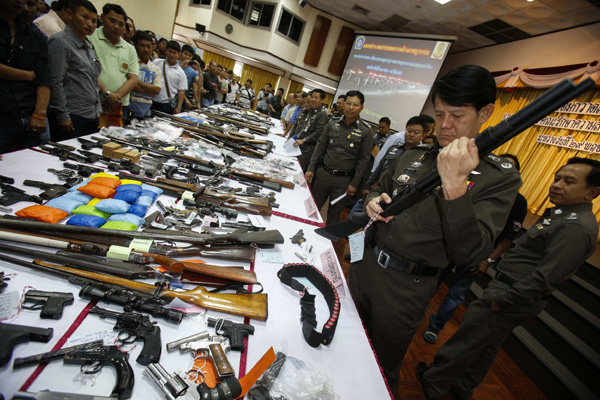Thai exiles make plans to fight coup
|
Thai police officers display to the media weapons seized in raids following a military coup on May 22, during a news conference at the Provincial Police Region headquarters in Bangkok, on Thursday. Thailand's military council has ordered that "war weapons", including explosive devices and grenade launchers, be surrendered to local authorities by Tuesday as part of a nationwide crackdown to stop political violence. Athit Perawongmetha / Reuters |
Activists say they will organize peaceful protests against military
Around 15 Thai political leaders who are allied to the ousted government plan to establish a movement outside Thailand to lead a campaign of civil disobedience against military rule, two members of the group said on Thursday.
General Prayuth Chan-ocha seized power in a coup on May 22 and has since silenced the "red shirt" supporters of former prime minister Yingluck Shinawatra and her brother, former premier Thaksin Shinawatra.
The military has detained many politicians and activists and demanded as a condition of release that they sign documents stating they will avoid politics and halt anti-coup activities.
If the plan proceeds, the group would represent the first attempt to mount organized opposition to military rule. The two activists said they had yet to decide exactly what measures the group would use, but said they would be peaceful and would aim to fill the leadership vacuum among anti-coup elements.
"We believe democracy in Thailand has been systematically destroyed," said former government minister and "red shirt" founding member Jakrapob Penkair in a telephone interview from Phnom Penh, the Cambodian capital.
"People have been chastened, hunted and bullied with no sense of fairness, justice or decency. We aim to create an organization for all groups protesting the coup inside and outside Thailand. This would be a non-radical group using civil disobedience."
Thaksin, who lives in exile, was not involved in the movement, said Jakrapob and a second member of the group, fugitive former member of parliament Sunai Julapongsathorn.
It is unclear how much momentum the movement would gain among those opposed to the junta without the backing of Thaksin, who revolutionized Thai politics and commands the loyalty of millions in the populous north.
The coup was the latest twist in nearly a decade of confrontation between Thaksin and the Bangkok-based royalist establishment, which sees him as a threat to its interests.
Thaksin has not given any guidance to his supporters since the military seized power. He has effectively funded and controlled the "red shirt" movement from self-imposed exile since fleeing a 2008 conviction for abuse of power. He was ousted by the military in a previous coup in 2006.
"We will advance with or without him," said Jakrapob, a former spokesman for Thaksin. "He's not involved and had no influence in setting this up."
Jakrapob was forced to resign as a minister in May 2008 after being accused of violating Thailand's strict lese-majeste laws, and has lived in Cambodia for some time.
The lese-majeste laws are in force to protect the reputation of ruling monarch King Bhumibol Adulyadej and his family members.
The military has summoned Jakrapob and other prominent "red shirt" leaders to report on Monday.
Asked if the military had heard of the plans to set up a movement abroad, Winthai Suvaree, deputy spokesman for the military's National Council for Peace and Order, said: "Thai law can't touch those who flee abroad, but if we know where they are we will ask for international cooperation to bring them back to Thailand.
"We are monitoring groups resisting the coup. Those who were summoned and do not show up will face the law and their case will be treated as criminal. If they return to Thailand and have cases pending, then these may be brought to a military court," he told a news conference.



















